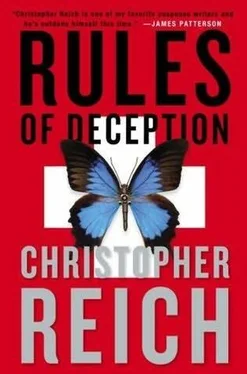A web log, thought Jonathan as his eyes scanned the display. A live site where operatives logged on to offer details about their mission. Real-time spying.
He scoured the screen for a web address, but none was listed. He accessed the file directory, then checked the browser software. The default address was at http://international.resources.net. The name meant nothing to him.
He returned to Intelink’s main page. More entries:
7-2; 13:11 CET. Falcon.A message sent the day before from Falcon.
Confirm Robin compromised. Cease all communication. Await instructions HQ.
7-2; 10:55 CET. Cormorant. Rook contacted self. Referenced Thor. Rook in possession of Robin’s PDA. Stated Robin killed. Confirm.
7-2; 09:55 CET. Falcon. Transfer approved.
7-2; 08:45 CET. Robin. Request transfer Sfr. 100,000 to account at BPT. Replacement lost funds.
Jonathan reviewed the text. “Cormorant” was Hoffmann. “Hawk” was unknown. “Falcon,” the individual who approved funding and who confirmed to his agents that Robin was dead, looked to be in charge. “Robin” being Gottfried Blitz. And Emma? Where was she?
He scrolled back through the numerous posts, searching for a specific time, a date. He saw it. Tuesday. The day after Emma’s accident.
5-2; 07:45 CET. Falcon. Nightingale lost in climbing mishap. Rook alive.
There it was. Emma was “Nightingale.” Jonathan was “Rook,” as in chess piece. The castle. Or was it “Rook” as in con, to deceive? That made more sense, he thought angrily. And then he realized that he was wrong on both accounts. If all the agents had been given avian code names, then so had he.
Rook. The British cousin of the crow, but a larger, more aggressive bird altogether.
Devouring line after line of text, he retraced the events of the past few days as viewed from the other side. Here was Blitz stating that the car was in place in Landquart and that the baggage claims had been sent to Emma’s hotel. Then came Emma’s reply that the mail had been delayed due to an avalanche on the train tracks and that she would pick up the bags the next day. The postings were sent at six-thirty in the evening the night before their climb.
Jonathan looked up. The busy restaurant was swirling around him. The lights were too bright. The voices too loud.
Emma had been in contact with her network all along.
Just then, a new line appeared on the display. The letters blinked to make sure they caught the reader’s attention.
A live posting.
8-2; 21:56 CET. Falcon. PJ landed 20:16 ZRH. En route to hotel. Meeting confirmed 9-2; 14:00 Belvedere. Bring shipment advice. Trade for Gold.
Tomorrow, February 9, at two p.m. He knew of the Belvedere Hotel in Davos. A five-star palace for the rich and famous. But who was P.J.? And what was the “Gold” he planned to trade for the shipment advice?
And then, almost instantaneously, a response from Cormorant. Confirmation copied.Hoffmann was headed to Davos.
The letters blinked for five seconds, then assumed their normal amplification.
For the first time, Jonathan noted a tab at the bottom of the page marked “Reference.” Clicking on the word, he was rewarded with a list of hyperlinks. More code. The date, followed by a name he’d come to know well. ZIAG. Zug Industriewerk.
He opened the first link.
It was a bill of lading detailing the contents of a shipment from ZIAG to Xanthus Medical Instruments in Athens. Two hundred advanced global positioning handheld navigation systems. Technical specifications as noted. Price: twenty-thousand Swiss francs per unit. To ship Friday, February 9, from Zurich to Athens aboard Swissair at seven in the evening.
Was this the shipment advice mentioned in Falcon’s earlier instruction to Cormorant?
He clicked on the other hyperlinks. More of the same. Detailed invoices. Not GPS navigation systems but insulin pumps, vacuum tubes, carbon extruders. Shipped December 10, Zurich to Cairo via Nice. Shipped November 20, Zurich to Dubai. Shipped October 21, Geneva to Amman via Rome. The final destination always in the Middle East.
The shipments dated back several months. The first had been made on October 12, a little more than six weeks after he and Emma returned from the Middle East.
As Jonathan reread the list of goods, he realized that he’d been right when he’d told Hoffmann his suspicions. You’re making things you shouldn’t and sending them to people who shouldn’t have them.
But who was P.J.? And what was he doing coming to the World Economic Forum in Davos?
Jonathan finished his meal and paid the bill in cash. Leaving the restaurant, he stopped in an adjoining kiosk and looked over the selection of newspapers. Nearly every one featured a headline related to the World Economic Forum. He purchased two Swiss newspapers, as well as the Herald Tribune and the Financial Times . Folding them under one arm, he crossed the parking lot to the Mercedes.
Turning into his aisle, he found himself staring into the beams of a slow-moving car. It took him a moment to make out the sirens on top. He kept his pace steady, walking directly toward the police car. The cruiser advanced at a crawl. A two-man patrol. A handheld spotlight illuminated one license plate, then the next. He reached his car and got inside. A moment later, the cabin was flooded with light. He waited, breath tight in his chest. The illumination made it easy to see the newspaper on the seat beside him. A photograph on the front page of the Neue Zürcher Zeitung showed a Middle Eastern man delivering a fiery oration. The caption identified him as Parvez Jinn, Iranian Minister of Technology, and stated that he was due to give an address to the WEF in Davos Friday evening in which he would detail his country’s nuclear aspirations.
Parvez Jinn. The initials were not lost on Jonathan. He’d found P.J.
And then the cabin was dark again. The spotlight moved on to the next vehicle. He wondered if this had been a routine check or if he had been the target?
He started the engine and pulled out of the space.
He was going back to the mountains.
He was going to Davos.
Tobias Tingeli lived in an imposing Victorian mansion high on the Zürichberg near the Dolder Grand Hotel. The four-story stone structure had been his father’s and, before that, his father’s father’s, all the way back to 1870 when the first Tobias Tingeli made his fortune bankrolling Kaiser Wilhelm I in his war against Napoleon III.
Relations between Germany and the private bank had remained close over the years. During the Second World War, the Tingeli Bank had been a haven not only for the National Socialists, who transacted a majority of their gold sales through its offices, but also for the Americans, the British, and the Russians, whose spy services all found it to be equally accommodating. Since then, the bank had been content to concentrate on a private clientele, but rumors of questionable activity never quite faded away.
“Marcus, come in,” boomed Tobias Tingeli. “I was surprised to hear from you.”
Von Daniken smiled. Very surprised, no doubt, he thought to himself. “Hello, Tobi. Things are well? I hope I’m not disturbing you.”
“Not at all. Don’t just stand there freezing. Let me take your jacket.”
Tobias Tingeli IV, “Tobi” to his friends, was the new breed of banker. He was a young man, ten years von Daniken’s junior. Answering the door in faded jeans, a black turtleneck, his abundant black hair combed into a fashionable mess, he looked more like an artist than a businessman.
Читать дальше












